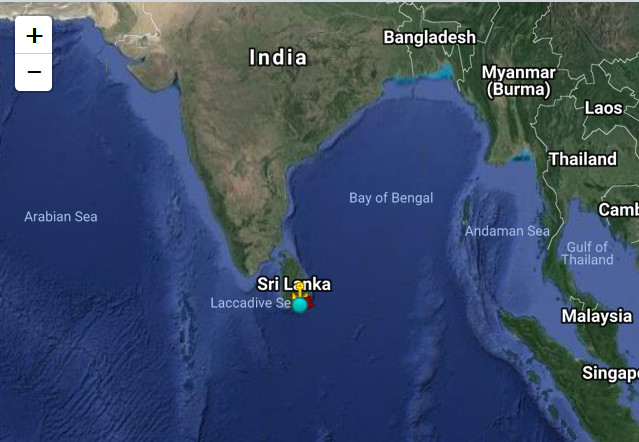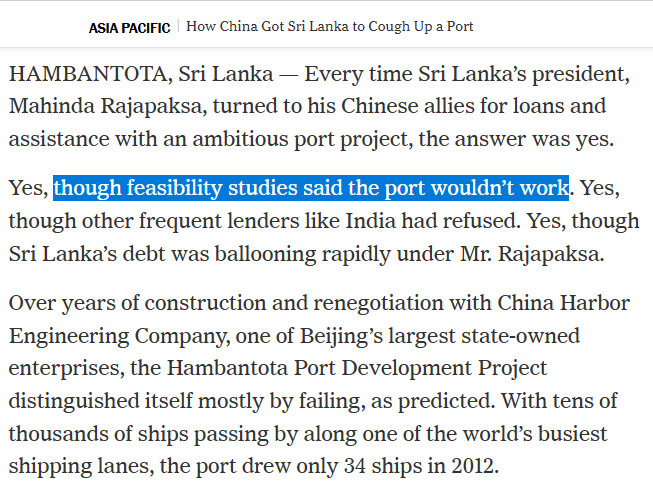Moon of Alabama
China's Port In Sri Lanka's Is Good Business - The NYT's Report On It Is Propaganda
The core of the NYT piece was about the Chinese financed development of the Hambantota port in Sri Lanka:
'China's financial imperialism' is a relatively new genre in western journalism. China is providing loans to other countries to build infrastructure. If those countries can not pay back the loans, China offers to lease and manage the infrastructure built with its money. That somehow is supposed to create a "debt trap for vulnerable countries".
Yesterday the New York Times lamented about Sri Lanka's Hambantota Port Development Project:
...
The port is in a strategic location right alongside the shipping lines between Asia and the Middle East and Africa.

There were several inconsistencies in the NYT piece. It used old statistics to claim that the port was rarely used. However up-to-date statistics proved the opposite. It also lied about Sri Lanka's debt burden only 10% of which was to China.
Thirty-two months after Moon of Alabama debunked the piece, and twenty- nine months after Peter Lee (aka Chinahand) did similar in greater detail, The Atlantic sets out to do the same:
The Chinese ‘Debt Trap’ Is a Myth
The narrative wrongfully portrays both Beijing and the developing countries it deals with.
It notes that the New York Times anti-China propaganda piece was often used by the Trump administration to attack that country:
The Trump administration pointed to Hambantota to warn of China’s strategic use of debt: In 2018, former Vice President Mike Pence called it “debt-trap diplomacy”—a phrase he used through the last days of the administration—and evidence of China’s military ambitions. Last year, erstwhile Attorney General William Barr raised the case to argue that Beijing is “loading poor countries up with debt, refusing to renegotiate terms, and then taking control of the infrastructure itself.”
But the NYT's central claim of 'finance imperialism' was completely wrong:
Our research shows that Chinese banks are willing to restructure the terms of existing loans and have never actually seized an asset from any country, much less the port of Hambantota. A Chinese company’s acquisition of a majority stake in the port was a cautionary tale, but it’s not the one we’ve often heard. With a new administration in Washington, the truth about the widely, perhaps willfully, misunderstood case of Hambantota Port is long overdue.
The Atlantic piece is well researched and it thoroughly destroyed the case the New York Times had tried to make. It also caught the NYT in an outright lie. The original NYT piece had claimed in its second paragraph:
feasibility studies said the port wouldn’t work

The Atlantic authors however found two studies that said the opposite:
It was the Canadian International Development Agency—not China—that financed Canada’s leading engineering and construction firm, SNC-Lavalin, to carry out a feasibility study for the port. We obtained more than 1,000 pages of documents detailing this effort through a Freedom of Information Act request. The study, concluded in 2003, confirmed that building the port at Hambantota was feasible, and supporting documents show that the Canadians’ greatest fear was losing the project to European competitors.
...
We reviewed a second feasibility report, produced in 2006 by the Danish engineering firm Ramboll, that made similar recommendations to the plans put forward by SNC-Lavalin, arguing that an initial phase of the project should allow for the transport of non-containerized cargo—oil, cars, grain—to start bringing in revenue, before expanding the port to be able to handle the traffic and storage of traditional containers.

They also found, just like MoA did, that the port debt to China was not relevant for Sri Lanka's payment problems:
Sri Lanka owed more to Japan, the World Bank, and the Asian Development Bank than to China. Of the $4.5 billion in debt service Sri Lanka would pay in 2017, only 5 percent was because of Hambantota. The Central Bank governors under both Rajapaksa and Sirisena do not agree on much, but they both told us that Hambantota, and Chinese finance in general, was not the source of the country’s financial distress.
The authors of the Atlantic piece, who are professors at John Hopkins and Harvard, conclude that there is no Chinese 'financial imperialism'. The whole concept is wrong:
The notion of “debt-trap diplomacy” casts China as a conniving creditor and countries such as Sri Lanka as its credulous victims. On a closer look, however, the situation is far more complex. China’s march outward, like its domestic development, is probing and experimental, a learning process marked by frequent adjustment. After the construction of the port in Hambantota, for example, Chinese firms and banks learned that strongmen fall and that they’d better have strategies for dealing with political risk. They’re now developing these strategies, getting better at discerning business opportunities and withdrawing where they know they can’t win. Still, American leaders and thinkers from both sides of the aisle give speeches about China’s “modern-day colonialism.”
'Financial imperialism' and 'modern-day colonialism' is what the U.S. exercises when it blocks IMF and Worldbank loans or binds them to political conditions. China is so far not known for doing such.
Thanks to The Atlantic for debunking that anti-China dreck the NYT had put on its frontpage.
Just one question: What took you so long?
h/t Ian Goodrum
Posted by b on February 9, 2021 at 18:20 UTC | Permalink
|
Comments Sampler (Original thread) Anyone paying attention recently is fully aware that the New York Times is often wrong. Now, the question becomes if the errors are just sloppy journalism or intentional misreporting with an agenda. Posted by: Mar man | Feb 9 2021 18:40 utc | 2 You want an example of recent "debt trap"? Here you go: Ecuador: reversing the pandemic slump?
@ b who wrote — Kudos to you b but my question would be why at all? Admitting the existence of propaganda is a slippery slope I would posit. What incentive does The Atlantic have for calling BS? I would think the owners would get a visit from some 3-letter agency politely asking them to support their country...So when is some media organization/journalist going to take on the cult of global private finance? This Atlantic piece is an attempt but is focusing on the other end of the finance spectrum...the public/humanist meme. Posted by: psychohistorian | Feb 9 2021 18:52 utc | 4 Anyone paying attention recently is fully aware that the New York Times is often wrong. Posted by: Mar man | Feb 9 2021 18:40 utc | 2 And after a day or two these hit pieces are faithfully republished in Australian papers with their faces buried deep in their US masters ass. It's all part of a concerted demonization and consensus building effort to desensitize the populace when call for a selective renege of bonds and asset held by China comes. Oh and the draft will probably come right after that. Posted by: A.L. | Feb 9 2021 19:03 utc | 5 The Atlantic is this the same group as the Neocon Atlantic Council or are they different. If they are the same group then why would they ever have a good article, the purge has not been completed yet? Posted by: Christian J. Chuba | Feb 9 2021 19:12 utc | 6 French economist, Eric Toussaint, is the leading analyst of the Third World debt trap: https://www.cadtm.org/The-debt-trap Literally everything the USG says is projection. Posted by: Prof K | Feb 9 2021 19:32 utc | 7 The port in Sri Lanka would have already been quite profitable for the country if the Modi government didn't align with the US and scrap BCIM. As it stands, the port will probably remain unprofitable until the completion of CMEC, that is assuming the new coup government doesn't do a similar turn like Modi. Posted by: Sid Victor Cattoni | Feb 9 2021 19:53 utc | 8
|
[premium_newsticker id="211406"]
The views expressed are solely those of the author and may or may not reflect those of The Greanville Post
YOU ARE FREE TO REPRODUCE THIS ARTICLE PROVIDED YOU GIVE PROPER CREDIT TO THE GREANVILLE POST
VIA A BACK LIVE LINK.





Projection at it's finest/worst. think IMF,USAID etc.etc. See "Confessions of an Economic Hitman"
The Book in Three Sentences:
The United States is engaging in a modern form of slavery by using the World Bank and other international organizations to offer huge loans to developing nations for construction projects and oil production. On the surface this appears to be generous, but the money is only awarded to a country if it agrees to hire US construction firms, which ensures a select few people get rich. Furthermore, the loans are intentionally too big for any developing nation to repay and this debt burden virtually guarantees the developing nation will support the political interests of the United States.
Posted by: Gazza | Feb 9 2021 18:29 utc | 1